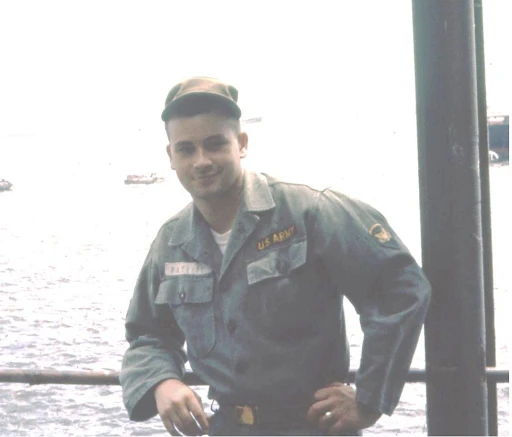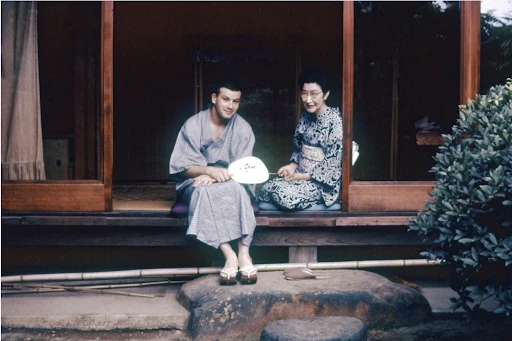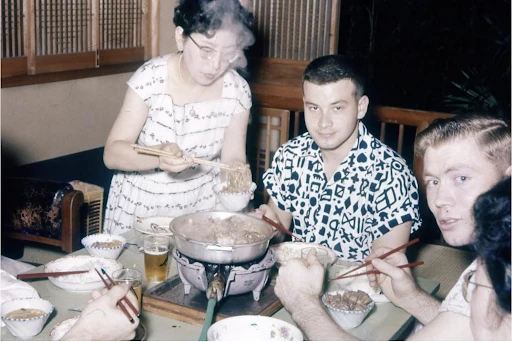Being fluent in different languages is a fundamental skill for foreign service. While many foreign service officers learn languages as they develop their careers, fewer start a foreign service career following their love for learning languages. This is the story of how Foreign Service Reserve Officer (Unlimited) John Ratliff III found a Japanese family that kicked off his foreign service career.
In his memoir Living with a Japanese family: My Way to a Career in the U.S. Department of State Focused on Japan, Ratliff tells us his journey from being a college student in Louisiana majoring in voice, to becoming a Specialist 2nd class at the U.S. Army base Oji Camp in Japan. While his Korean language skills had brought him across the Atlantic, he quickly started learning Japanese. In 1956 he was relocated to Kyoto, where he met a Japanese family that rented him a room. The Yoshikawa family became his lifelong friends and a great inspiration in his foreign service career.
Ratliff has dedicated an entire life to foreign language training, becoming the director of the Foreign Service Institute Japanese Language Center in Yokohama (1969), and a dean for Overseas Language Programs at the Foreign Service Institute (1976). Upon retirement, he and his family founded a commercial foreign language training center in the U.S. (1986). Ratliff is the author of various memoirs about his foreign service career, including the one cited for this Moment.
John Ratliff III’s interview was conducted by Charles Stuart Kennedy on September 24, 1997.
Read John Ratliff III’s full oral history HERE.
Read John Ratliff III’s memoir Living with a Japanese family: My Way to a Career in the U.S. Department of State Focused on Japan HERE.
Read John Ratliff III’s memoir of his time in Vietnam HERE.
Drafted by Hideki Harada Oyakawa
ADST relies on the generous support of our members and readers like you. Please support our efforts to continue capturing, preserving, and sharing the experiences of America’s diplomats.
Excerpts:
“. . . . as time went on, my interest in Japan and Japanese grew stronger and stronger.”
Learning (to love) Japanese:
At that time, I was not thinking beyond my time in the army in Japan but as time went on, my interest in Japan and Japanese grew stronger and stronger . . . . I had continued to study Japanese on my own and tried to speak Japanese whenever the opportunity arose. One day, a fellow soldier came to me. He had been driving an army truck just outside the base and had hit an elderly Japanese man.
The man’s injuries were serious enough to require hospitalization. The fellow soldier said he had been advised to go to the hospital to apologize and express his condolences.

Because of my reputation for speaking Japanese, he asked me to go with him to talk to the injured man in Japanese . . . . When the two of us arrived at the injured man’s hospital room, two or three family members were also there. I conveyed my friend’s condolences in Japanese, and it seemed to have a positive effect on both the injured man and his relatives. I was flattered to be asked but also relieved that I had been able to accomplish it.
“Thanks to Mrs. Yoshikawa, I had an experience that I never expected.”
Building memories with a host family in Japan:

[A] couple of soldiers had rooms in a Japanese home, in addition to their beds in the barracks . . . . Rooms for both guests were on the ground floor and with traditional “tatami” mat floors. In hot weather, fans kept the guests cool and huge mosquito nets were strung from the ceiling in each corner of the room, protecting the entire room from mosquitos. One of the first things that happened after I moved in was that the landlady gave me a kimono!
Actually, It was a yukata, which is a summer kimono. I was delighted. One time I was having snacks with Mr. Yoshikawa [the landlord], speaking only in Japanese . . . . He then handed me a small serving on a plate of an unknown food, which I tasted. I asked him what it was, and he told me its Japanese name. I looked it up in my handy Japanese-English dictionary and learned that this “delicacy” was Salted Fish Guts!
One morning, Mrs. Yoshikawa [the landlady] asked me if I would be interested in visiting a Sake brewery. It turns out there was one within walking distance of her house. She arranged it, probably knowing the manager. I arrived at the brewery and was treated like a VIP, with a personal tour, followed by an invitation to sample the product. Thanks to Mrs. Yoshikawa, I had an experience that I never expected.
“. . . . nothing can take away those wonderful memories of living with the Yoshikawa family.”
Memories remain:
Living with a Japanese family got me started on a career with the U.S. Department of State Foreign Service Institute School of Language Studies that lasted from 1962 to 1985 . . . . I traveled to Japan in 2005, many years after I had retired from the U.S. Department of State. I went to Kyoto and to Momoyama. Of course, the army camp was no longer there and had been replaced by a housing complex. The Yoshikawa house also was no longer there. But nothing can take away those wonderful memories of living with the Yoshikawa family.

TABLE OF CONTENTS HIGHLIGHTS
Education and Background
Army Security Agency 1954–57
B.S. in Japanese, Georgetown University 1957–62
Joined the Foreign Service 1962
Tokyo, Japan—Assistant Director of the FSI Japanese School 1963–1967
Bangkok, Thailand—Regional Language Supervisor for SE Asia 1967
Yokohama, Japan—Director of the FSI Japanese Language Center 1969–1974
Washington DC—Assistant Dean for Overseas Language Programs, FSI 1976–1980
Washington DC—Associate Dean for Overseas Language Programs, FSI 1981–1985
